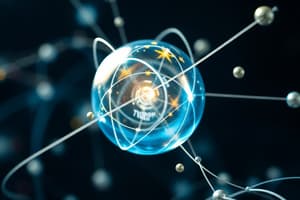Podcast
Questions and Answers
What is the main focus of classical mechanics?
What is the main focus of classical mechanics?
The study of the motion of objects and the forces that act upon them.
What is the broad field that covers a wide range of topics including mechanics, electromagnetism, thermodynamics, and quantum mechanics?
What is the broad field that covers a wide range of topics including mechanics, electromagnetism, thermodynamics, and quantum mechanics?
Physics.
Who were some of the ancient Greek philosophers who made early observations about the natural world?
Who were some of the ancient Greek philosophers who made early observations about the natural world?
Thales, Anaximander, and Heraclitus.
In which century did the scientific revolution, led by figures like Galileo Galilei and Sir Isaac Newton, revolutionize the field of physics?
In which century did the scientific revolution, led by figures like Galileo Galilei and Sir Isaac Newton, revolutionize the field of physics?
What natural science studies matter, energy, and their interactions to understand the fundamental properties of the universe?
What natural science studies matter, energy, and their interactions to understand the fundamental properties of the universe?
What is the study of electric and magnetic fields and their interactions?
What is the study of electric and magnetic fields and their interactions?
What is the study of heat and its effects on energy?
What is the study of heat and its effects on energy?
Who developed the theory of electromagnetism, unifying electricity and magnetism?
Who developed the theory of electromagnetism, unifying electricity and magnetism?
What does quantum mechanics study?
What does quantum mechanics study?
What is the study of the behavior of large numbers of particles?
What is the study of the behavior of large numbers of particles?
Who developed the laws of motion that describe the relationship between force, mass, and acceleration?
Who developed the laws of motion that describe the relationship between force, mass, and acceleration?
Who proposed the theory of universal gravitation?
Who proposed the theory of universal gravitation?
Which theory describes the behavior of matter and energy at the atomic and subatomic levels?
Which theory describes the behavior of matter and energy at the atomic and subatomic levels?
Who formulated the theory of general relativity?
Who formulated the theory of general relativity?
What theory describes the unification of electricity and magnetism into a single electromagnetic force?
What theory describes the unification of electricity and magnetism into a single electromagnetic force?
What fundamental principles has physics shaped our understanding of?
What fundamental principles has physics shaped our understanding of?
Flashcards are hidden until you start studying
Study Notes
Introduction
Physics is a natural science that studies matter, energy, and their interactions to understand the fundamental properties of the universe. It is one of the oldest academic disciplines, with a history spanning over 2,000 years. Physics is a broad field that covers a wide range of topics, including mechanics, electromagnetism, thermodynamics, quantum mechanics, and more. In this article, we will explore the history of physics, its branches, and some of the most significant discoveries and theories.
History of Physics
The history of physics can be traced back to ancient Greece, where philosophers like Thales, Anaximander, and Heraclitus made some of the earliest observations about the natural world. In the 17th century, the scientific revolution led by figures like Galileo Galilei and Sir Isaac Newton revolutionized the field of physics by introducing the scientific method and developing the laws of motion and universal gravitation.
Branches of Physics
Physics is divided into several branches, each focusing on specific aspects of the physical world. Some of the main branches include:
- Classical Mechanics: The study of the motion of objects and the forces that act upon them. It includes the laws of motion and the principles of mechanics.
- Electromagnetism: The study of electric and magnetic fields and their interactions. It includes the work of James Clerk Maxwell and the development of the electromagnetic field theory.
- Thermodynamics: The study of heat and its effects on energy. It includes the first and second laws of thermodynamics and the concept of entropy.
- Quantum Mechanics: The study of the behavior of matter and energy at the atomic and subatomic levels. It includes the work of Planck, Einstein, and Schrödinger.
- Statistical Mechanics: The study of the behavior of large numbers of particles. It includes the development of the ideal gas law and the concept of entropy.
Significant Discoveries and Theories
Throughout its history, physics has made numerous groundbreaking discoveries and theories that have shaped our understanding of the universe. Some of the most significant include:
- Laws of Motion: Galileo Galilei's laws of motion, which describe the relationship between force, mass, and acceleration, and Sir Isaac Newton's three laws of motion, which provide a framework for understanding the behavior of objects.
- Universal Gravitation: Newton's theory of universal gravitation, which states that any two objects with mass are attracted to each other with a force that depends on their masses and the distance between them.
- Electromagnetic Field Theory: James Clerk Maxwell's theory of electromagnetism, which unifies electricity and magnetism into a single electromagnetic force.
- Quantum Theory: The development of quantum theory, which describes the behavior of matter and energy at the atomic and subatomic levels.
- General Relativity: Einstein's theory of general relativity, which revolutionized our understanding of gravity and the structure of the universe.
Conclusion
Physics is a fascinating and complex field that has shaped our understanding of the universe and the fundamental principles that govern it. From the laws of motion to the theory of general relativity, the discoveries and theories of physics have had a profound impact on our lives and our understanding of the world around us. As we continue to explore the mysteries of the universe, the field of physics will undoubtedly continue to evolve and push the boundaries of human knowledge.
Studying That Suits You
Use AI to generate personalized quizzes and flashcards to suit your learning preferences.




